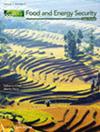以生物炭为中心的循环解决方案可以改善咖啡的碳足迹,并带来共同的好处
IF 4.5
2区 农林科学
Q2 FOOD SCIENCE & TECHNOLOGY
引用次数: 0
摘要
每年,咖啡会导致至少9000万吨二氧化碳当量的排放。在这里,我们简要概述了咖啡出口准备过程,重点关注与生产和运输相关的主要碳排放源。然后,我们提出了一个路线图,有可能显著减少咖啡对气候的影响。我们专注于物流的脱碳和从废弃生物质中生产生物炭和其他有机肥料。这些策略加在一起,每年可以抵消近300万吨二氧化碳当量。最后,本分析强调了目前的知识差距和可能进一步减少温室气体的领域。本文章由计算机程序翻译,如有差异,请以英文原文为准。

Circular Solutions Centered on Biochar Could Improve the Carbon Footprint of Coffee With Co-Benefits
Annually, coffee results in the emission of at least 90 million tons of CO2-equivalents. Here we provide a brief overview of the coffee export preparation process, with a focus on key sources of carbon emissions linked to production and transportation. We then present a road map that has the potential to significantly reduce the climate impact of coffee. We focus on the decarbonization of logistics and the production of biochar and other organic fertilizers from waste biomass. Together, these strategies could neutralize almost 3 million tons of CO2-equivalents annually. Finally, this analysis highlights current knowledge gaps and areas where further mitigation of greenhouse gases might be possible.
求助全文
通过发布文献求助,成功后即可免费获取论文全文。
去求助
来源期刊

Food and Energy Security
Energy-Renewable Energy, Sustainability and the Environment
CiteScore
9.30
自引率
4.00%
发文量
76
审稿时长
19 weeks
期刊介绍:
Food and Energy Security seeks to publish high quality and high impact original research on agricultural crop and forest productivity to improve food and energy security. It actively seeks submissions from emerging countries with expanding agricultural research communities. Papers from China, other parts of Asia, India and South America are particularly welcome. The Editorial Board, headed by Editor-in-Chief Professor Martin Parry, is determined to make FES the leading publication in its sector and will be aiming for a top-ranking impact factor.
Primary research articles should report hypothesis driven investigations that provide new insights into mechanisms and processes that determine productivity and properties for exploitation. Review articles are welcome but they must be critical in approach and provide particularly novel and far reaching insights.
Food and Energy Security offers authors a forum for the discussion of the most important advances in this field and promotes an integrative approach of scientific disciplines. Papers must contribute substantially to the advancement of knowledge.
Examples of areas covered in Food and Energy Security include:
• Agronomy
• Biotechnological Approaches
• Breeding & Genetics
• Climate Change
• Quality and Composition
• Food Crops and Bioenergy Feedstocks
• Developmental, Physiology and Biochemistry
• Functional Genomics
• Molecular Biology
• Pest and Disease Management
• Post Harvest Biology
• Soil Science
• Systems Biology
 求助内容:
求助内容: 应助结果提醒方式:
应助结果提醒方式:


